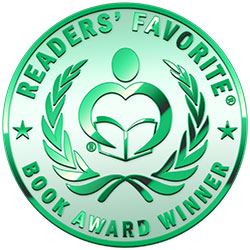
 This author participates in the Readers' Favorite Free Book Program, which is open to all readers and is completely free. The author will provide you with a free copy of their book in exchange for an honest review. You and the author will discuss what sites you will post your review to and what kind of copy of the book you would like to receive (eBook, PDF, Word, paperback, etc.). To begin, click the purple email icon to send this author a private email.
This author participates in the Readers' Favorite Free Book Program, which is open to all readers and is completely free. The author will provide you with a free copy of their book in exchange for an honest review. You and the author will discuss what sites you will post your review to and what kind of copy of the book you would like to receive (eBook, PDF, Word, paperback, etc.). To begin, click the purple email icon to send this author a private email.
![]() This author participates in the Readers' Favorite Book Review Exchange Program, which is open to all authors and is completely free. Simply put, you agree to provide an honest review an author's book in exchange for the author doing the same for you. What sites your reviews are posted on (B&N, Amazon, etc.) and whether you send digital (eBook, PDF, Word, etc.) or hard copies of your books to each other for review is up to you. To begin, click the purple email icon to send this author a private email, and be sure to describe your book or include a link to your Readers' Favorite review page or Amazon page.
This author participates in the Readers' Favorite Book Review Exchange Program, which is open to all authors and is completely free. Simply put, you agree to provide an honest review an author's book in exchange for the author doing the same for you. What sites your reviews are posted on (B&N, Amazon, etc.) and whether you send digital (eBook, PDF, Word, etc.) or hard copies of your books to each other for review is up to you. To begin, click the purple email icon to send this author a private email, and be sure to describe your book or include a link to your Readers' Favorite review page or Amazon page.
![]() This author participates in the Readers' Favorite Book Donation Program, which was created to help nonprofit and charitable organizations (schools, libraries, convalescent homes, soldier donation programs, etc.) by providing them with free books and to help authors garner more exposure for their work. This author is willing to donate free copies of their book in exchange for reviews (if circumstances allow) and the knowledge that their book is being read and enjoyed. To begin, click the purple email icon to send this author a private email. Be sure to tell the author who you are, what organization you are with, how many books you need, how they will be used, and the number of reviews, if any, you would be able to provide.
This author participates in the Readers' Favorite Book Donation Program, which was created to help nonprofit and charitable organizations (schools, libraries, convalescent homes, soldier donation programs, etc.) by providing them with free books and to help authors garner more exposure for their work. This author is willing to donate free copies of their book in exchange for reviews (if circumstances allow) and the knowledge that their book is being read and enjoyed. To begin, click the purple email icon to send this author a private email. Be sure to tell the author who you are, what organization you are with, how many books you need, how they will be used, and the number of reviews, if any, you would be able to provide.

Reviewed by Jamie Michele for Readers' Favorite
Enemy of Humanity by Jubei Raziel is a non-fiction study of Christianity and the Bible, setting itself above the parapet as a wholly faithful exploration of facts, without fear of influence customarily derived from conjecture or supposition. Raziel begins with an introduction to his journey, a casual read that launched an ambitious investigation. Over the course of thirty-three chapters, Raziel is meticulous in the combing through of a wide-ranging degree of wisdom from the origins of a holy book that has been indiscriminate in who it appropriates and then recycles its texts from, to the foundational enslavement by way of a creation story that Raziel is able to succinctly dissect using intellectual reasoning and the Bible's own scripture, and on to the background of popular catchphrases such as, “Love the sinner, hate the sin,” and the reality of what they mean.
Jubei Raziel holds absolutely nothing back in Enemy of Humanity, which I found to be so much more engaging and profoundly honest than the dozens of theses I've collected over the years. The narrative is a well-constructed balance of intelligentsia and the comfortable conversational style of a man who knows what he's talking about. And Raziel definitely knows what he's talking about. My favorite parts were found in chapters eight, Contra-Christianity where contradictions are laid bare in a near-perfect laundry list of tit-for-tat scripture, and twenty-two, wherein the stunting of psychological and emotional expansion results in subservient fixation to the church, “Because they’re catalyst to the paradigm.” If you're going to read a book that digs deep into the core of Christian theology and rounds up its findings with facts, Enemy of Humanity is your stop. All aboard.